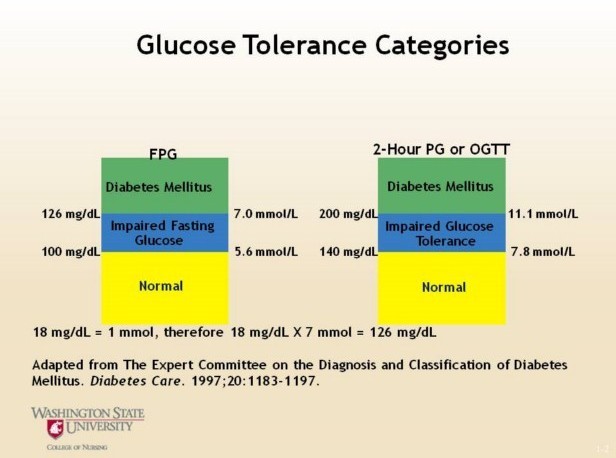A program of weight loss and exercise is recommended for a patient with impaired fasting glucose (IFG). When teaching the patient about the reason for these lifestyle changes, the nurse will tell the patient that:
The onset of diabetes and the associated cardiovascular risks can be delayed or prevented by weight loss and exercise.
Although the fasting plasma glucose levels do not currently indicate diabetes, the glycosylated hemoglobin will be elevated.
The high insulin levels associated with this syndrome damage the lining of blood vessels leading to vascular disease.
The liver is producing excessive glucose, which will eventually exhaust the ability of the pancreas to produce insulin, and exercise will normalize glucose production.
The Correct Answer is A
This statement is correct. Impaired fasting glucose (IFG) is a condition in which the fasting blood glucose level is higher than normal but not high enough to be diagnosed as diabetes. However, people with IFG are at increased risk of developing type 2 diabetes and cardiovascular disease. Weight loss and exercise can help to prevent or delay the onset of diabetes and reduce the risk of cardiovascular disease.

Nursing Test Bank
Naxlex Comprehensive Predictor Exams
Related Questions
Correct Answer is A
Explanation
GERD can increase the risk of aspiration (inhalation of stomach contents into the lungs), which can cause respiratory issues, including abnormal breath sounds. In these cases, monitoring of breath sounds may be more appropriate than monitoring of bowel sounds.
Bowel sounds are not typically monitored for GERD patients as GERD is a condition that affects the esophagus and the stomach, not the intestines. GERD is caused by the reflux of stomach contents into the esophagus, which can cause symptoms such as heartburn and regurgitation.
Abdominal girth is not routinely monitored for GERD patients as it is not typically related to the condition. GERD is a disorder that affects the esophagus and stomach and does not typically cause significant changes in abdominal size or girth. In rare cases, GERD can be complicated by a condition known as a para oesophageal hernia, which can cause a visible bulge in the abdomen. In these cases, monitoring of abdominal size and shape may be necessary.
The apical pulse is not routinely monitored for GERD patients as it is not directly related to the condition. GERD is a disorder that affects the digestive system, specifically the esophagus and stomach and does not typically have an impact on heart rate or rhythm.

Correct Answer is A
Explanation
Kegel exercises are designed to strengthen the pelvic floor muscles, which can help improve urinary incontinence. By teaching the patient how to perform Kegel exercises, the nurse can provide a non-invasive, effective intervention that the patient can perform on her own to help manage her urinary incontinence.
Assisting the patient to the bathroom q3hr (b) may help reduce the frequency of incontinence episodes but it does not address the underlying issue of weakened pelvic floor muscles.
Demonstrating how to perform Crede’s maneuver (c) involves applying manual pressure to the bladder to assist with urination and is not appropriate for managing urinary incontinence related to laughing or coughing.
Placing a commode at the patient’s bedside (d) may be appropriate for patients who have difficulty with mobility or accessing the bathroom, but it does not address the underlying issue of weakened pelvic floor muscles causing urinary incontinence.


Whether you are a student looking to ace your exams or a practicing nurse seeking to enhance your expertise , our nursing education contents will empower you with the confidence and competence to make a difference in the lives of patients and become a respected leader in the healthcare field.
Visit Naxlex, invest in your future and unlock endless possibilities with our unparalleled nursing education contents today
Report Wrong Answer on the Current Question
Do you disagree with the answer? If yes, what is your expected answer? Explain.
Kindly be descriptive with the issue you are facing.
